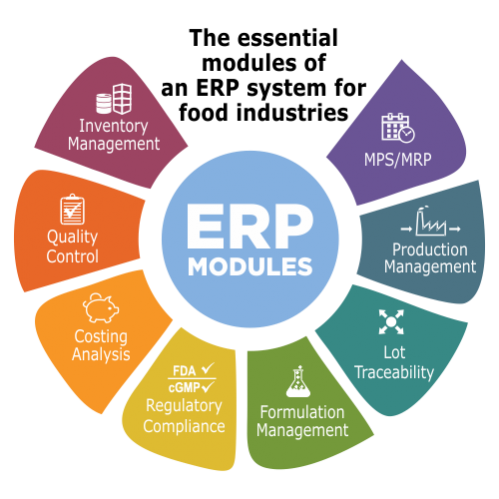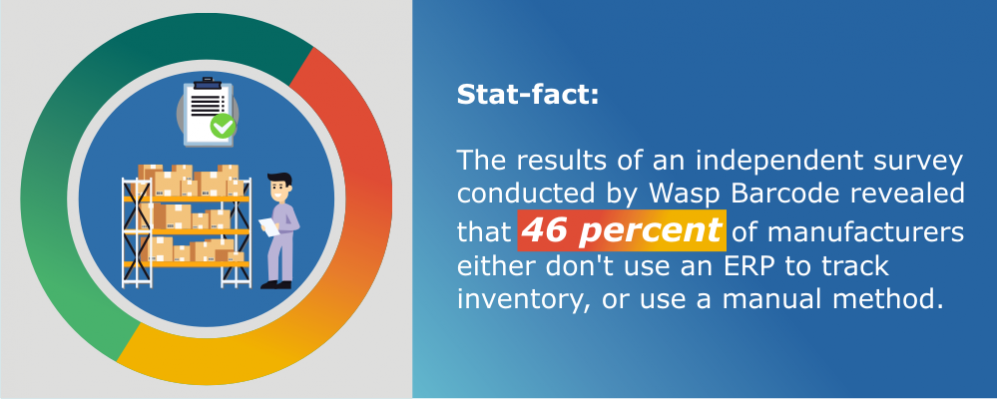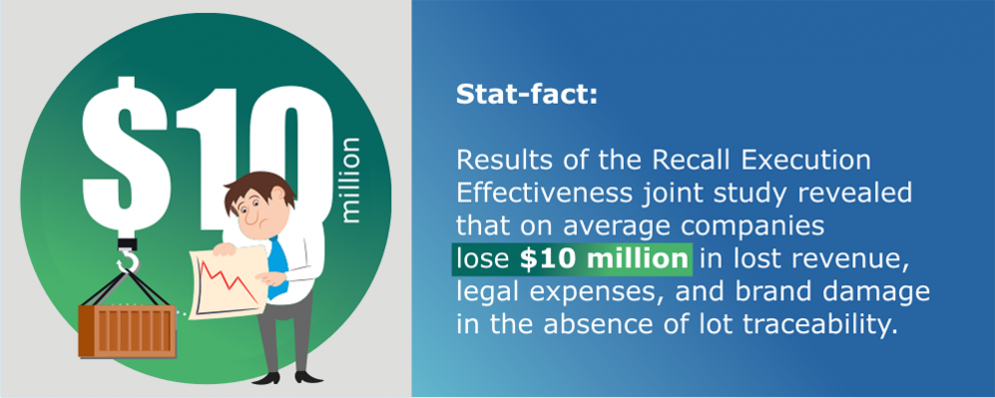
For manufacturers, predominantly the ones who are into process manufacturing businesses such as pharmaceutical, food & beverages, chemicals, paints & coatings, and personal care & cosmetics, among others, there is no dearth of issues and problems.
Battling challenges on various fronts such as traceability, compliance, quality, inventory, etc., the process manufacturers seek a panacea in an enterprise resource planning (ERP) software, which over the years has become a fundamental requirement for their business.
Talking particularly about the food industry, a food ERP system helps the manufacturers effectively deal with their unique challenges by meeting the business-specific needs, continuously streamlining their business processes, and integrating different areas of business.
And how exactly does an ERP for food industry pulls this off?
The food & beverage industry is massively large and diverse in nature. It comprises of a number of sub-verticals, namely– dairy, meat & poultry, packaged food, fresh produce, beer, and edible oil, etc. It thus, doesn’t come as a surprise that the industry faces challenges on multiple fronts.
The food manufacturers operate mostly on thin margins, and face challenges such as dealing with demand fluctuations, long & complex supply chains, tight competition, stringent regulatory & food safety requirements, and inventory which comes with limited shelf life, etc.
An ERP software for food industry, through its modules, not just helps manufacturers meet the aforementioned challenges, but also predict the accurate demand levels, produce cost-effective products of the highest quality, ensure supply chain transparency, improve profit margins and comply with the stringent food safety and regulatory requirements.
Let’s take a look at the food ERP modules that make it possible:

Not using an ERP for food industry can result in a shocking amount of capital being tied up in inventory. Among other things, not having an ERP can mean that the food manufacturers find it difficult to manage and report their inventory information, track inventory within their business, and update inventory after every action in real-time.
A food manufacturing software, through its inventory management module, makes tracking, tracing, and locating the inventory possible for the manufacturers within their business. Additionally, by integrating with the warehouses, it enables warehouse as well as bin transfers, and even inter-location moves. Its forecasting tools help assess demand and thus manage inventory accordingly.
Quality Control module
Another area where food manufacturers struggle is quality control. The food products have a limited shelf life, and the manufacturers need to know how fast the material should be consumed before they expire. They also need a mechanism that allows them to ensure quality right from the time the material enters the four walls to the time the finished products leave them.
A food ERP software’s Quality Control (QC) functionality alerts the manufacturers when ingredients are nearing or past their expiration dates. Also, through quality tests, it allows the manufacturers to receive, produce and ship products that meet customer and quality requirements, and take immediate and counteractive action against items that fail QC inspection.
Costing analysis module
Determining the price that ensures profitability, and controlling the cost without compromising with the quality is often a headache for the food manufacturers. But, the cost analysis module of an ERP for the food industry makes it possible.
It not just closely monitors and controls costs, but also facilitates decision making on prices of end items keeping profitability in mind. Equipped with the ‘what if’ analysis ability, it allows comparison between actual costs, planned purchase costs, and standard costs.
Regulatory compliance module
More food products coming from countries with lower health and safety standards calls for stricter regulations and guidelines on the part of regulators. Compelled to comply with them, the manufacturers turn to food ERP software, which helps meet all the local, regional, national and international regulatory requirements, as well as cGMP guidelines.
Tracking non-conformance (NC), and performing corrective action preventive action (CAPA) for rejected material is made possible by an ERP for the food industry, which also allows generating labels that are fully compliant with government regulations.
Lot traceability module
With pretty stringent regulations in place, the need for lot tracking and traceability arises. A food ERP system provides automated end-to-end bi-directional lot traceability from raw materials to the finished product and vice versa.
The module allows tracking the movement and destination of various products, raw materials, other ingredients and packaging throughout the different stages of production, processing, and distribution.
This allows the food manufacturers to find out exactly where the nonconformity happens, and which lot to recall, that too in practically no time at all.
Formula management module
Managing recipes is an intricate job for the manufacturers, primarily made complex by the need to maintain different units of measurement, unlimited manufacturing instructions, and numerous versions of it, etc. And needless to say, it is not possible to manage all this manually.
Through its various features, a food ERP solution makes formula management easier for the manufacturers. It allows storage, retrieval, and revision of every formula used in the business, and comes with a host of other functionalities such as support to different units of measurement, automatic formula sizing, instant roll-back, anytime-anywhere material substitution, etc.
Production module
For an industry as multi-tiered and complex as the food industry, a food ERP software comes as a boon. By it, numerous capabilities, and effective management, tracking & control of the production activities from batch creation, allocation, inspection, quality checking, to finally closing, the production module strengthens the manufacturing business on the production front.
Food ERP also allows full and partial closing of batches for immediate shipment of urgent orders, thus simplifying and smoothening the overall production process.
MPS/MRP module
The Material Requirement Planning (MRP) & Master Production Scheduling (MPS) functionalities help manufacturers streamline and optimize the production process.
Using MRP, manufacturers can do a number of things such as getting the on-time availability of materials required for production, timely delivery of finished products, and make optimal use of manufacturing resources.
Whereas, with MPS functionality, manufacturers can make better production plans, prioritize the requirement, meet consumer demands, protect the lead time and stabilize the production function on the whole.
Closing thoughts
BatchMaster ERP for Food & Beverages comes loaded with all the food ERP modules & functionalities mentioned in this blog, and has enough room to accommodate all the micro-verticals of the food & beverage manufacturing industry. It comes from the stable of leading makers of process manufacturing ERP solutions for over 30 years, BatchMaster.
Get in touch with our food experts today for a demo of this feature & experience-rich solution.

